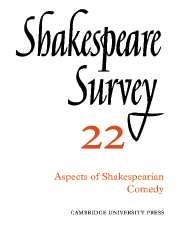Book contents
- Frontmatter
- Old and New Comedy
- An Approach to Shakespearian Comedy
- Shakespeare, Molière, and the Comedy of Ambiguity
- Comic Structure and Tonal Manipulation in Shakespeare and Some Modern Plays
- Laughing with the Audience: ‘The Two Gentlemen of Verona’ and the Popular Tradition
- Shakespearian and Jonsonian Comedy
- Two Magian Comedies: ‘The Tempest’ and ‘The Alchemist’
- ‘Thou that beget’st him that did thee beget’: Transformation in ‘Pericles’ and ‘The Winter’s Tale’
- The Words of Mercury
- Why Does it End Well? Helena, Bertram, and The Sonnets
- Some Dramatic Techniques in ‘The Winter’s Tale’
- Clemency, Will, and Just Cause in ‘Julius Caesar’
- Thomas Bull and other ‘English Instrumentalists’ in Denmark in the 1580s
- Shakespeare in the Early Sydney Theatre
- The Reason Why: The Royal Shakespeare Season 1968
- The Year's Contributions to Shakespearian Study 1 Critical Studies
- 2 Shakespeare’s Life, Times and Stage
- 3 Textual Studies
- Index
- Plate Section
The Year's Contributions to Shakespearian Study 1 - Critical Studies
Published online by Cambridge University Press: 28 March 2007
- Frontmatter
- Old and New Comedy
- An Approach to Shakespearian Comedy
- Shakespeare, Molière, and the Comedy of Ambiguity
- Comic Structure and Tonal Manipulation in Shakespeare and Some Modern Plays
- Laughing with the Audience: ‘The Two Gentlemen of Verona’ and the Popular Tradition
- Shakespearian and Jonsonian Comedy
- Two Magian Comedies: ‘The Tempest’ and ‘The Alchemist’
- ‘Thou that beget’st him that did thee beget’: Transformation in ‘Pericles’ and ‘The Winter’s Tale’
- The Words of Mercury
- Why Does it End Well? Helena, Bertram, and The Sonnets
- Some Dramatic Techniques in ‘The Winter’s Tale’
- Clemency, Will, and Just Cause in ‘Julius Caesar’
- Thomas Bull and other ‘English Instrumentalists’ in Denmark in the 1580s
- Shakespeare in the Early Sydney Theatre
- The Reason Why: The Royal Shakespeare Season 1968
- The Year's Contributions to Shakespearian Study 1 Critical Studies
- 2 Shakespeare’s Life, Times and Stage
- 3 Textual Studies
- Index
- Plate Section
Summary
Faced with a body of material as heterogeneous and sometimes as strange as that dramatized in Pericles, Prince of Tyre, and with a scene that is, to quote Malone, set ‘dispersedly in various countries’, the present reviewer, seeking to make a ‘true Relation’ not of ‘the whole Historie’ but of as much of it as has come his way, cannot but be grateful for having been provided with an ‘ancient Gower’ to serve as Prologue and even on occasions as Chorus. Walter Whiter died in 1832, yet there are two good reasons why his A Specimen of a Commentary on Shakespeare, admirably edited by the late Alan Over and Mary Bell, should appear in this context. First, there is much here that has never been published before, since the editors have wisely chosen to include the additions and revisions Whiter made for a projected second edition of his original publication (1794) that was never called for. Secondly, however, Whiter is, in a sense, a modern critic, because it is only during the last thirty years or so that the significance of his approach and findings has come to be recognized. His main aim, at least when he began his work, was to establish the validity of his theory, based on the ideas of Locke, about the role of association in creative writing. He says: ‘I define therefore the power of this association over the genius of the poet, to consist in supplying him with words and with ideas, which have been suggested to the mind by a principle of union unperceived by himself, and independent of the subject to which they are applied’ (pp. 62–3). And he goes on to insist that the writer is ‘totally unconscious of the effect and principle of their union’ (p. 64).
- Type
- Chapter
- Information
- Shakespeare Survey , pp. 145 - 166Publisher: Cambridge University PressPrint publication year: 1970

